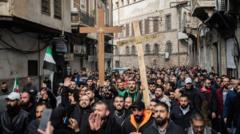The recent burning of a Christmas tree in the central Syrian town of Suqaylabiyah has ignited widespread protests, emphasizing the need for the new Islamist authorities to safeguard minority rights. Videos circulating on social media depicted the scene of the burning tree in a predominantly Christian community, capturing the growing unrest among local residents.
The main Islamist faction, Hayat Tahrir al-Sham (HTS), which played a significant role in overthrowing President Bashar al-Assad, stated that they had arrested foreign fighters believed to be responsible for the act. HTS officials have pledged to uphold the rights of religious and ethnic groups within Syria, as tensions continue to rise.
Footage also showed masked individuals pouring a liquid over the Christmas tree just prior to Christmas Eve, leading to speculation about their intent. After the incident, an HTS representative was seen reassuring the gathered crowd that the damaged tree would be restored before the evening celebrations, even performing a gesture of solidarity by holding up a cross—an unusual sight given the group’s Islamist inclinations.
Protests subsequently erupted within the capital, Damascus, with demonstrators vocally expressing their disapproval of foreign combatants. In various neighborhoods, people carried crosses and raised Syrian flags while chanting affirmational slogans about their faith and national identity. One protestor, Georges, voiced concerns over the community's ability to practice Christianity freely, questioning their place in Syria should such freedoms be restricted.
Syria's rich tapestry of ethnic and religious groups includes Christians, Kurds, and Druze among others, each seeking assurance of their safety following the recent upheaval. Under new leadership following the historical transition from Bashar al-Assad's regime, many displaced citizens are returning home; however, the security of minorities remains uncertain.
Despite HTS's earlier reputation as an extremist organization, the group has shifted to a more moderate stance in recent years, claiming to aim for a more inclusive governance. The recent establishment of a ministry of defense that seeks to unify various factions hints at an evolving governance strategy aimed at fostering national unity despite ongoing challenges.
Internationally, HTS continues to be classified as a terrorist organization by the UN and Western powers. Nonetheless, recent diplomatic shifts suggest potential changes, exemplified by the removal of a significant bounty on HTS's leader, Ahmed al-Sharaa, and continued military initiatives from the US aimed at addressing ongoing threats from rival jihadist factions.
With the country's stability at stake, the future of minority protections and the management of foreign involvement remain as pivotal challenges for the new leadership in Syria.
The main Islamist faction, Hayat Tahrir al-Sham (HTS), which played a significant role in overthrowing President Bashar al-Assad, stated that they had arrested foreign fighters believed to be responsible for the act. HTS officials have pledged to uphold the rights of religious and ethnic groups within Syria, as tensions continue to rise.
Footage also showed masked individuals pouring a liquid over the Christmas tree just prior to Christmas Eve, leading to speculation about their intent. After the incident, an HTS representative was seen reassuring the gathered crowd that the damaged tree would be restored before the evening celebrations, even performing a gesture of solidarity by holding up a cross—an unusual sight given the group’s Islamist inclinations.
Protests subsequently erupted within the capital, Damascus, with demonstrators vocally expressing their disapproval of foreign combatants. In various neighborhoods, people carried crosses and raised Syrian flags while chanting affirmational slogans about their faith and national identity. One protestor, Georges, voiced concerns over the community's ability to practice Christianity freely, questioning their place in Syria should such freedoms be restricted.
Syria's rich tapestry of ethnic and religious groups includes Christians, Kurds, and Druze among others, each seeking assurance of their safety following the recent upheaval. Under new leadership following the historical transition from Bashar al-Assad's regime, many displaced citizens are returning home; however, the security of minorities remains uncertain.
Despite HTS's earlier reputation as an extremist organization, the group has shifted to a more moderate stance in recent years, claiming to aim for a more inclusive governance. The recent establishment of a ministry of defense that seeks to unify various factions hints at an evolving governance strategy aimed at fostering national unity despite ongoing challenges.
Internationally, HTS continues to be classified as a terrorist organization by the UN and Western powers. Nonetheless, recent diplomatic shifts suggest potential changes, exemplified by the removal of a significant bounty on HTS's leader, Ahmed al-Sharaa, and continued military initiatives from the US aimed at addressing ongoing threats from rival jihadist factions.
With the country's stability at stake, the future of minority protections and the management of foreign involvement remain as pivotal challenges for the new leadership in Syria.



















